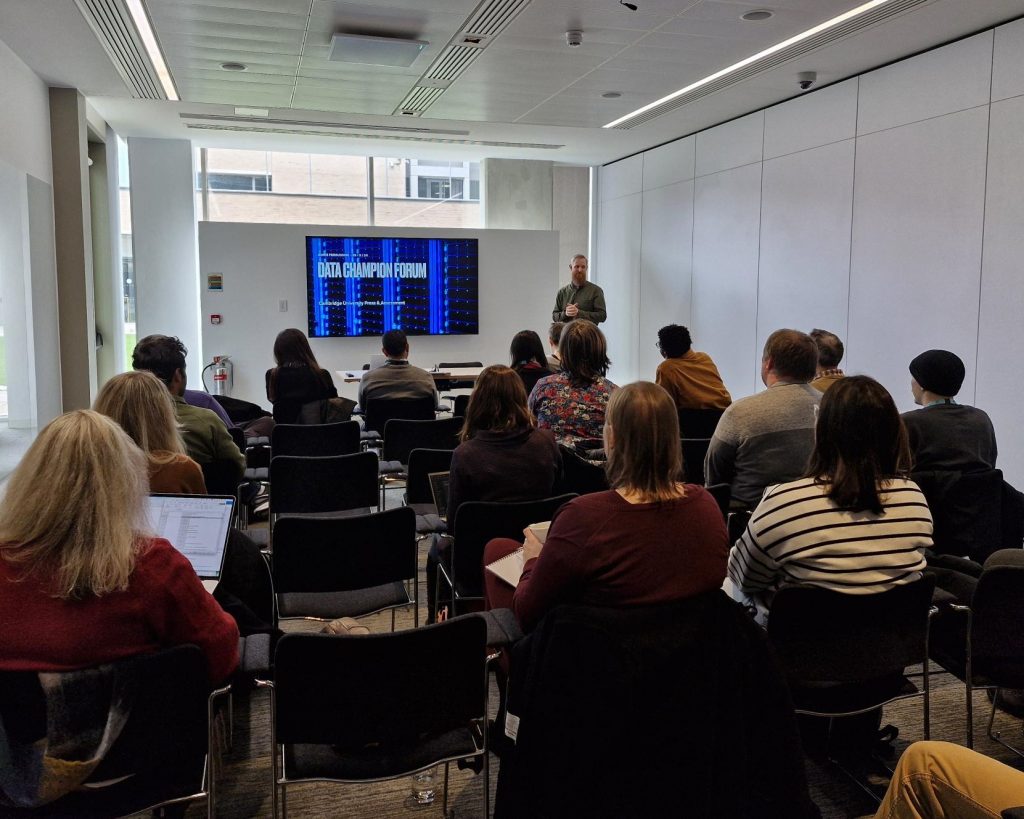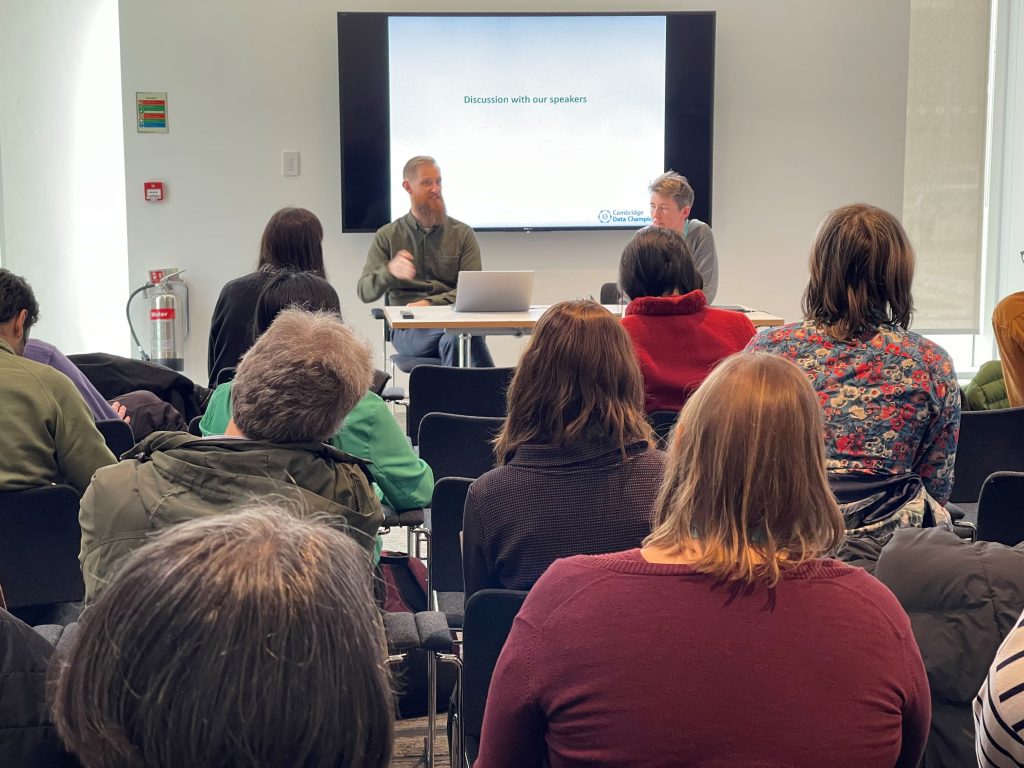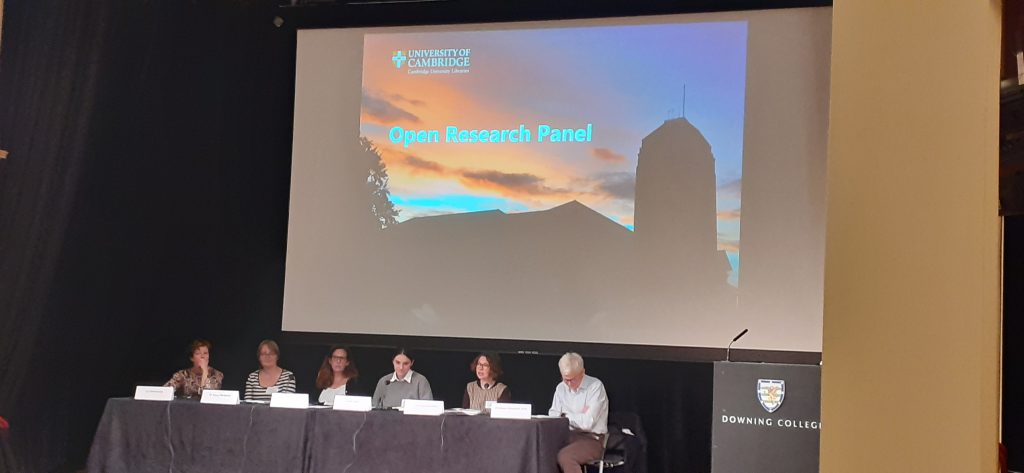The Data Champions were treated to a big data themed session for the March Data Champion forum, hosted at (and sponsored by) the Cambridge University Press and Assessment in their amazing Triangle building. First up was Dr James Fergusson, course director for the MPhil in Data Intensive Science, who described how the exponential growth in data accumulation, computing and artificial intelligence (A.I.) capabilities has led to a paradigm shift in the world of cosmological theorisation and research, potentially changing with it scientific research as a whole.

As he explained, over the last two decades cosmologists have seen a rapid increase of data points on which to base their theorisation – from merely 14 data points in 2000 to 800 million data points in 2013! Through the availability of these data points, the paradigm for research in cosmology started to shift completely – from being theory based to being based on data. With several projects beginning soon that will see vast amounts of data generated daily for decades to come, this trend is showing no signs of slowing down. The only way to cope with this exponential increase in data generation is with computing power, which has also been growing exponentially. In tandem with these sectors of growth is the growth of machine learning (ML) capabilities as the copious amount of data not only necessitates immense amounts of computing power but also ML capabilities to process and analyse all of the data. Together, these elements are fundamentally changing the story of scientific discovery. What was once a story of an individual researcher having an intellectual breakthrough is becoming the story of machine led, automated discovery. While it used to be the case that an idea, put through the rigour of the scientific method, would lead to the generation of data, now the reverse is not only possible but become increasingly likely. Data is now generated first before a theory is discovered, and the discovery may come from AI and not a scientist. This, for James, can be considered the new scientific method.
Dr Anne Alexander has been familiarising herself with AI, especially in her capacity as Director of Learning at Cambridge Digital Humanities (CDH) where she has been incorporating critique of AI into a methodology of research in the digital humanities, particularly in the area of Critical Pedagogy. In her work, Anne addresses how structural inequalities can be reinforced, rather than challenged by AI systems. She demonstrated this through two projects that she was involved with at CDH. One was called Ghost Fictions, a series of workshops with the aim of encouraging critical thinking about automated text generation using AI methods both in scholarly work and in social life. The project resulted in a (free to download) book titled Ghost, Robots, Automatic Writing: an AI level study guide, which was intended as a provocation of a future where books, study guides and examinations are created by Large Language Models (LLM) (perhaps a not so distant future). Another project involved using AI to create characters for a new novel, which revealed the racial biases of ChatGPT when prompted with certain names. Yet, perhaps the most worrying aspect about the transformative forms of AI is the immediate and consequential impact it has on the environment. The computational power needed to quench the thirst for the exponential amounts of data needed to train and progress AI chat bots, LLMs and image generation systems, requires vast computing power which in turn generates a lot of heat and requires large amounts of water to operate. As Anne demonstrated, this could be increasingly problematic for many places as the global climate crisis continues. Locally, we have the case of West Cambridge, which is already water stressed, but also home to the University’s data centre and where the new DAWN AI supercomputer is located. Through these examples, she posed the questions: does AI perpetuate further harm and inequality? Are the environmental costs of AI too high?

The themes that Anne concluded her presentation with formed the basis of the Q&A between the Data Champions and the speakers. The topic of the potential biases of AI and ML was put forward to James who agreed that his field of study could not escape it. That said, unlike the humanities, biases in physics can potentially be helpful as it may help make the scientific process as objective as possible. However, this could clearly be problematic for humanities research, which tends to deal with social systems and relations, and views of the world. The topic of the environmental cost of AI was also touched on, with which James commented that energy insufficiency is a problem and getting harder to justify, and solutions might only create new problems as the demand for this technology is not slowing down. Anne expressed her concerned and suggests that society at large should be consulted on this as the environment is a social problem thus society should have a say on what risk they are willing to be a part of. The question of the automation of science was also raised to James who admitted that preparing early career physicists for research now involves developing their software skills rather than subject knowledge expertise in physics or mathematics.





